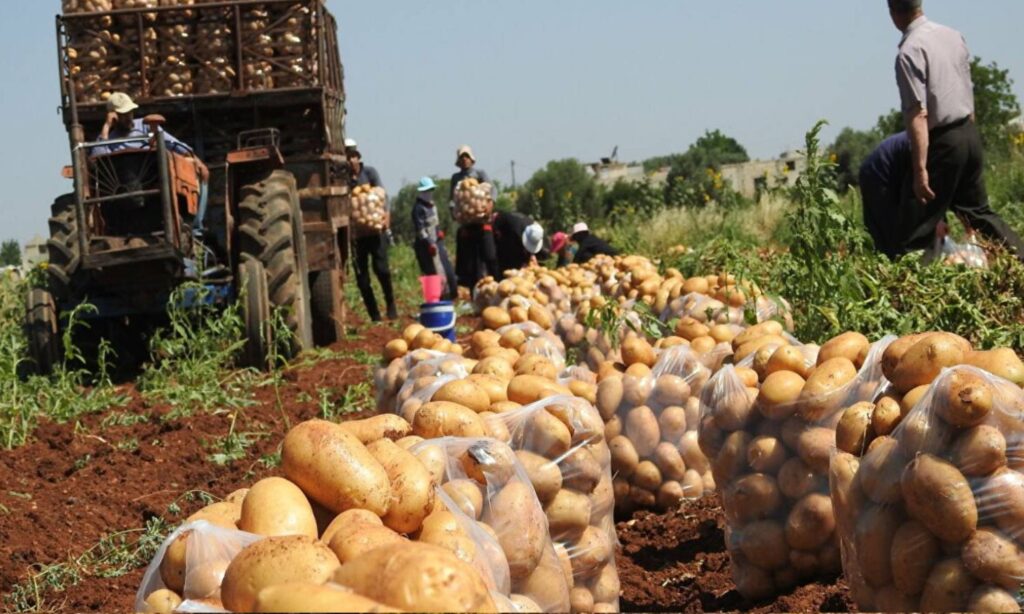Homs – Orwah al-Mundhir
Storage and refrigeration fees in Homs governorate experienced an unprecedented three-fold rise from 2021 due to higher energy costs and maintenance supplies, reducing the quantities of crops stored by farmers at the expense of an increase in merchants’ quantities.
Potato and onion crops are the most prominent crops entering the governorate’s cold storage rooms. The cost of storage per kilo increased to 100 Syrian pounds per month, marking a 400% rise from 2021, when the cost of storage was 25 pounds per kilo per month.
In the custom of cold storage, the refrigeration contract is signed for a period of three months at once and is extended on a monthly basis with a new agreement on the price between the owner of the refrigeration facility and the owner of the goods.
Increased hours of electricity rationing, higher prices of diesel, and doubling maintenance costs, three factors combined contributed to this rise, with most farmers deciding against refrigeration, while merchants stepped in with intentions of monopoly and control of the market over the coming period.
Diesel, alternative energy, and maintenance costs
Cold storage rooms rely mainly on massive engines that operate power generators for electricity, after rationing hours have risen to more than four hours of outage cut for each hour or less of electricity in Homs.
Cold rooms’ motors and compressors need 24 hours of electric current for at least the first month.
Owners of cold storage rooms are obliged to buy diesel on the black market at double the official price set by the regime’s government.
Abdallah, one of the owners of the cold rooms in the al-Houla plain in Homs countryside, told Enab Baladi that the cost of operating cold storage rooms is very high after the price of a barrel of diesel rose to more than 1.2 million Syrian pounds, explaining that the engines used to operate said cold rooms are among the largest (6 cylinders or more).
Abdallah added that each compressor or motor needs 15 amps for each vas, meaning that one room needs 45 amps to operate, which prompts the use of huge generators whose expenses exceed 1.5 barrels of diesel per day.
Refrigeration compressors need periodic maintenance to ensure their continuity. A compressor going out of service threatens to damage the goods inside the room. Maintenance costs and spare parts are affected by the change in the exchange rate because all parts are imported in foreign exchange.
Michel Ismail, one of the owners of maintenance workshops in the city of Homs, told Enab Baladi that the prices of spare parts for refrigeration compressors are completely subject to the exchange rates of the dollar because most of the devices used in Syria are of German or French origin. Maintenance fees rise with the increase in the prices of parts for most workshop owners.
An upcoming price crisis
The cost of refrigeration, packaging and transportation fees is charged to the price of the commodity when it leaves the cold storage room, which means that the high cost of refrigeration, transportation, and loading fees will be borne by the end consumer.
A merchant (who refused to be named for security reasons) in Souq al-Hal in Homs told Enab Baladi that the high fees would eventually be reflected in the price of the commodity. Potatoes entering the cold storage room were purchased at an average price of 900 pounds per kilo, added to it and the costs of refrigeration, transportation, and loading, so one kilo of potatoes would cost about 1,600 pounds after three months. He pointed out that, in 2021, the price of a kilo of potatoes was 4,000 pounds during the winter, saying that it was due to monopoly.
The merchant added that the process of introducing crops to cold storage rooms is a monopolistic process that has its pros and cons. Prices would have fallen further during the season, which would have caused farmers great losses if it was not for a section of the harvest being entered into storage rooms. After the crop runs out, cold storage rooms adjust prices and ensure that the vegetables are not lost permanently, especially for major crops such as potatoes and onions.
The regime’s government puts most of its refrigerants at public auctions to lease to merchants, thereby losing its role in intervening in the consumer interest and keeping the decision to price the substance fully in the hands of merchants.











